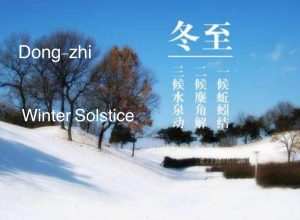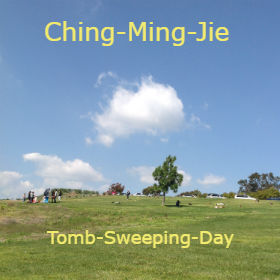
Dong-zhi (noun) 冬至 (Chinese): Winter Solstice (22th solar term), iterally in Chinese “Dong” 冬 = winter, “Zhi” 至 = extreme, implying “solstices”.
Example:
In ancient Chinese calendar also known as the “agriculture calendar” is one of the 24 solar terms which later spread to many Asian countries. Dong-zhi is the 22nd solar term and 11th intercalating month (midpoint). Dong-zhi begins when the Sun reaches the celestial longitude of 270° and ends when it reaches the longitude of 285°. Dong-zhi more often refers in particular to the day when the Sun is exactly at the celestial longitude of 270°. In the Gregorian calendar, Dong-zhi usually begins around 21 December and ends around 5 January.
In ancient China, people believed that starting at dong-zhi, daylight is getting longer and yang is rising. During Dong-zhi, heaven and the earth are beginning to flourish, representing the next cycle of a new year. Dong-zhi is a day of good luck. People usually have dumplings or rice balls for the dong-zhi festival. Dong-zhi is the first day of the “Nine Days” cycle in winter which is divided into nine cycles with a total of 81 days. The winter finishes at the end of the ninth cycle and the “third ninth days” (三九天) is usually the coldest days of the winter. In ancient China, Dong-zhi was divided into three periods 三候; during the first period 蚯蚓结 the earthworms in the soil are still curled up; elks’ horns fall off during the second period 麋角解; While in the third period 水泉动 the spring water in the mountain can flow.
The ancient Chinese people also checked the weather of the winter solstice to predict the lunar New Year’s weather, so there is an old saying ′′ dry winter solstice, wet New Year ′′. The Chinese custom of the winter solstice is to eat ′′ tang yuan ′′ in Southern China and to eat “dumplings” in Northern China, to welcome the arrival of a family reunion during the Dong-zhi festival.
Since ancient times, Dong-zhi has been a solar term for agricultural purposes in the lunar calendar. Dong-zhi is still remembered and celebrated as a Chinese traditional festival.

